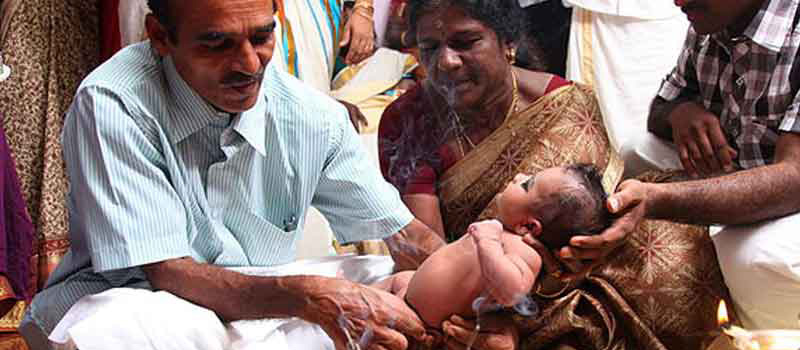The Naming Ceremony
Once the child is born, the first ceremony done to the baby is the Namakaranam (naming festival). People of Tamilnadu celebrate this festival grandly. According to the old custom (shastras) two kinds of names are given to the child one is the “vyavahara nama” and the other is “Ragasiya nama”.

The vyavahara name is the one known to all, the Ragasiya name is known only to the family members. It is the belief that the Ragasiya name will protect the child from evil spirits. But this practice is not been followed by many.
Nowadays, names of the child is selected depending on its birth star, nature and its ancestors. Most of the people keep their great grandfathers name to their child, in the belief that their child would be guarded by the sacred soul of these ancestors.
Significance in Culture and Religion:
In Tamil Nadu, a child's horoscope is frequently used to determine their name. The infant's birth chart (Jathagam) is examined by the family astrologer or priest, who then recommends the name's initials based on these lucky sounds or letters to bestow wealth and well-being upon the kid.
During a Hindu ceremony, a sacred fire is lit, and various rituals are performed to seek blessings from the gods. The priest recites mantras and prays for the child's prosperity, happiness, and well-being. The child has turmeric and kumkum (vermilion) applied to his forehead, symbolizing protection and purity. These materials are commonly used in Hindu ceremonies and are considered auspicious. To symbolize purity and life, a clay pot filled with milk or water is placed next to the fire. Sometimes, a small mirror is also placed in the pot to reflect the purity and light of God.
Custom:
After 30 days of the child birth, Namakaranam is conducted (the days may vary from region to region). On this day all the relatives gather at the child’s house, the selected name is first written in rice and then the father of the child recites the name secretly in the ear of the child thrice, this process is repeated by all the family members.
The names usually denotes wealth, harmony, richness, noble character, god or any remarkable personalities. Some people keep the name of Gods, as tribute for their immense blessing.
Places to perform Namakarnam:
Usually Namakaranam is performed in the house, but nowadays people are conducting this festival in famous temples.
Conclusion:
In Tamil Nadu, the Namakaranam ceremony is an important cultural event that combines social, astrological, and spiritual components. It is a time to celebrate new life, ask for divine graces, and formally welcome a child into the family and community. The naming ceremony, with its elaborate customs and exuberant festivities, is a fundamental aspect of Tamil culture, honouring traditions while welcoming contemporary ideas.